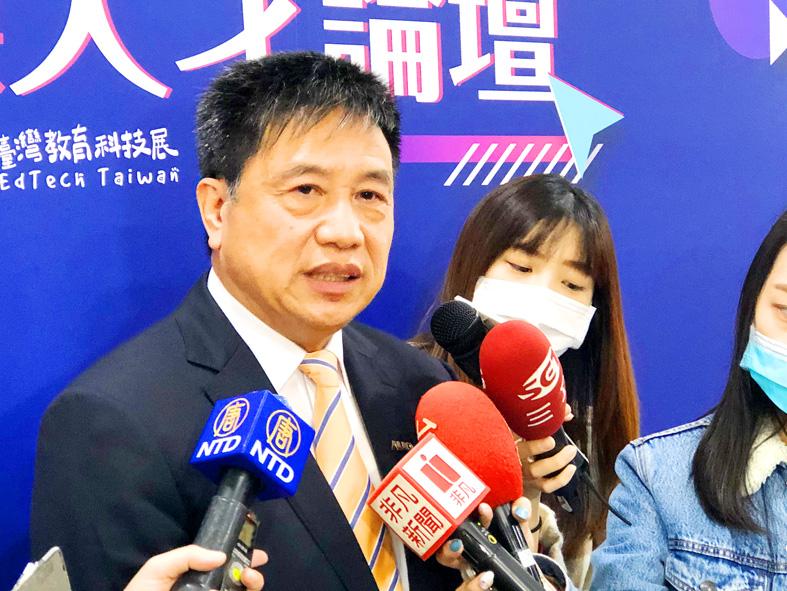AU Optronics Corp (AUO, 友達光電) yesterday said that net profit last quarter more than halved from a quarter earlier due to excessive channel inventory and it expects demand to dwindle further this quarter as consumer spending on TVs and other consumer electronics slows amid rising living costs.
Russia’s invasion of Ukraine has driven up prices for energy and key commodities, stoking concern about inflation risks and dampening consumer demand for TVs and information technology (IT) products, the Hsinchu-based panel maker said.
As a result, some customers have prioritized inventory digestion and slowed orders, causing average selling prices (ASP) of AUO products to drop at a quarterly pace of 6.28 percent last quarter, it said.

Photo: CNA
Net profit plummeted 51.5 percent to NT$5.16 billion (US$176.05 million) last quarter, compared with NT$10.66 billion a quarter earlier, the lowest in six quarters.
Net profit in the first quarter plummeted 56.38 percent from NT$11.83 billion a year earlier.
Gross margin decreased to 14.3 percent from 18.9 percent the previous quarter and 22 percent a year earlier.
AUO said that order visibility is not clear and time is needed for customers to reduce channel inventory to a healthy level given macroeconomic uncertainties, COVID-19 lockdowns in China and the war in Ukraine.
Against this backdrop, “AUO will adjust its equipment loading rate in accordance with market changes,” company chairman Paul Peng (彭双浪) told an online investors’ conference. “TVs and consumer IT products are to be affected more significantly.”
AUO’s factory utilization rate fell to below 90 percent last quarter, the company said.
Shipments this quarter are expected to dip by a low single-digit percentage from last quarter, while ASP would go down by a high single-digit percentage, it said.
Large lockdowns in China have reduced AUO’s production by between 30 percent and 40 percent at its plant in Kunshan, one of its major manufacturing sites for high-end notebook computer panels.
The company’s capacity expansion plan at the Kunshan plant was hampered by COVID-19 restrictions, with equipment and workers barred from entering the city, while the restrictions have also snarled transportation, driven up logistics costs and created a new squeeze on supply chains, Peng said.
“Don’t be surprised if I tell you we are short of carton boxes and packaging tape to ship our products,” Peng said. “Supply chain management becomes crucial.”
There is brisk demand for commercial notebook computers, niche products and tailor-made panels, including those used in vehicles, industrial devices and medical devices, which are less sensitive to industrial cycles.
Automotive panels accounted for 9 percent of the company’s total revenue of NT$81.53 billion last quarter. TV panels made up 17 percent. Panels used in monitors, notebook computers and mobile phones contributed 46 percent.

SMART MANUFACTURING: The company aims to have its production close to the market end, but attracting investment is still a challenge, the firm’s president said Delta Electronics Inc (台達電) yesterday said its long-term global production plan would stay unchanged amid geopolitical and tariff policy uncertainties, citing its diversified global deployment. With operations in Taiwan, Thailand, China, India, Europe and the US, Delta follows a “produce at the market end” strategy and bases its production on customer demand, with major site plans unchanged, Delta president Simon Chang (張訓海) said on the sidelines of a company event yesterday. Thailand would remain Delta’s second headquarters, as stated in its first-quarter earnings conference, with its plant there adopting a full smart manufacturing system, Chang said. Thailand is the firm’s second-largest overseas

‘REMARKABLE SHOWING’: The economy likely grew 5 percent in the first half of the year, although it would likely taper off significantly, TIER economist Gordon Sun said The Taiwan Institute of Economic Research (TIER) yesterday raised Taiwan’s GDP growth forecast for this year to 3.02 percent, citing robust export-driven expansion in the first half that is likely to give way to a notable slowdown later in the year as the front-loading of global shipments fades. The revised projection marks an upward adjustment of 0.11 percentage points from April’s estimate, driven by a surge in exports and corporate inventory buildup ahead of possible US tariff hikes, TIER economist Gordon Sun (孫明德) told a news conference in Taipei. Taiwan’s economy likely grew more than 5 percent in the first six months

SUPPLY RESILIENCE: The extra expense would be worth it, as the US firm is diversifying chip sourcing to avert disruptions similar to the one during the pandemic, the CEO said Advanced Micro Devices Inc (AMD) chief executive officer Lisa Su (蘇姿丰) on Wednesday said that the chips her company gets from supplier Taiwan Semiconductor Manufacturing Co (TSMC, 台積電) would cost more when they are produced in TSMC’s Arizona facilities. Compared with similar parts from factories in Taiwan, the US chips would be “more than 5 percent, but less than 20 percent” in terms of higher costs, she said at an artificial intelligence (AI) event in Washington. AMD expects its first chips from TSMC’s Arizona facilities by the end of the year, Su said. The extra expense is worth it, because the company is

The seizure of one of the largest known mercury shipments in history, moving from mines in Mexico to illegal Amazon gold mining zones, exposes the wide use of the toxic metal in the rainforest, according to authorities. Peru’s customs agency, SUNAT, found 4 tonnes of illegal mercury in Lima’s port district of Callao, according to a report by the non-profit Environmental Investigations Agency (EIA). “This SUNAT intervention has prevented this chemical from having a serious impact on people’s health and the environment, as can be seen in several areas of the country devastated by the illegal use of mercury and illicit activities,”